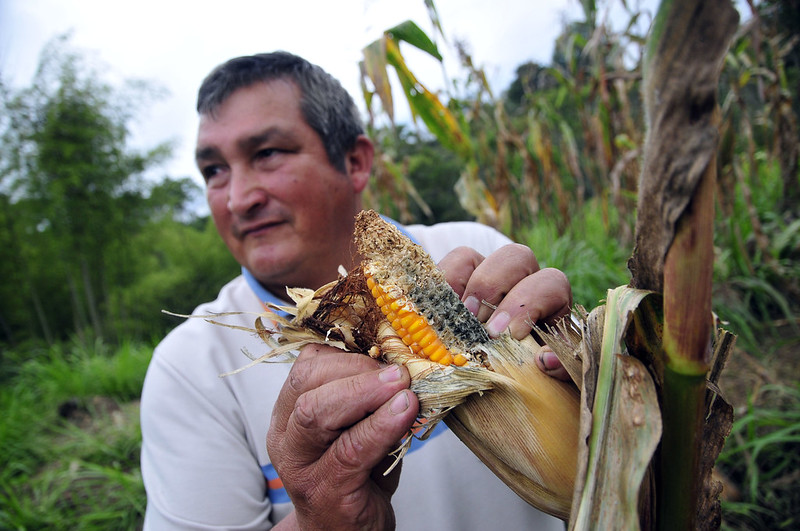Climate risks to trade and food security: implications for policy

Introduction
This policy brief is based on the report Climate Change, Trade, and Global Food Security. A synthesis of the report is available here.
The report provides a first systematic, quantitative assessment of transboundary climate risks to trade in six key agricultural commodities: maize, rice, wheat, soy, sugar cane, and coffee. The assessment is global in scope and allows for comparison of significant trading relationships, exporters, importers, and markets, providing a basis for policymaking and setting priorities in risk management.
*A summary of the brief can be found below. Download the full publication from the right-hand column for more details.
Implications
The findings of this report underscore the systemic nature of climate risk to agricultural commodity trade and global food security. Unlike other challenges experienced in international trade, climate change risk is present everywhere, simultaneously. Climate change will increase the risk of compound events, potentially affecting multiple major breadbasket regions in the same season. Even under nearer term scenarios, the stress put on agricultural commodity trade by variable and generally decreasing yields due to climate change is likely to heighten volatility and threaten the stability of commodity markets.
The high likelihood of negative impacts on commodity production worldwide radically reduces the space in which actors will be able to diversify, substitute and hedge agricultural commodity trade risks.
A retreat from global integration and a return to protectionism and regionalization could destabilize markets further, likely to the detriment of those countries who can least afford to compete in such a world. Free and open access to international markets will help all participants to meet the daunting challenge of achieving food security in a world challenged by climate change, population growth and shifting diets.
We do not yet know what a “climate resilient” trade profile looks like. We do not know what balance of domestic production and access to international markets, or how many or which types of trade partners, will offer the most resilience against uncertain but systemic risks in the global agricultural commodity trade. What we do know is that there is a pressing need for multilateral cooperation to address these risks and develop effective, coordinated responses.
Policy implications
Effective and just adaptation action is vital, particularly in key exporting countries
This places responsibility on producer countries to consider the wider systemic effects of domestic adaptation actions. It also underscores the need for international value chain actors and their investors to ensure that private-sector adaptation contributes to achieving “just resilience” at both local and global scales. Further, it places responsibility on the international community to provide the necessary political, legal, institutional, financial and logistical support for adaptation in countries that lack capacity, and to build robust structures for international cooperation to jointly address these shared, systemic risks.
Prioritizing global cooperation on adaptation, and mechanisms to achieve it
Whereas climate change adaptation has traditionally been pursued as a nationally driven or even local process, our results invite decision makers to rethink the value of global cooperation on adaptation.
Fortunately, there are mechanisms that can help countries build systemic resilience to climate change, principally via the United Nations Framework Convention on Climate Change (UNFCCC) and the Paris Agreement. In particular, Article 7 of the Paris Agreement establishes the Global Goal on Adaptation (GGA) to enhance adaptive capacity and resilience and reduce vulnerability. It also frames adaptation as a “global challenge”, recognizing its “regional and international dimensions.” There is ample space in this context to include the important transboundary elements of climate risk.
Rethinking climate finance for adaptation
This report reveals that all countries have a shared interest in building climate resilience: importers benefit when exporters can adapt to the impacts of climate change and sustain their agricultural production. Therefore, importers will want to see – and consider what they can do to facilitate – successful adaptation in other countries, particularly those with which they trade.
This raises new questions about how international climate finance for adaptation is targeted. In addition to providing finance to single countries, important global or international systems – such as the global maize market – can be identified and adaptation finance contributed toward building resilience in that system, to the benefit of all who participate in it.
Who is responsible for adapting to climate risks to food trade?
This report provides a basis from which to ask challenging questions about the governance of climate change risk in an interconnected world. For example, which government agencies should “own” responsibility for adapting to transboundary climate risk? And what is the appropriate division of labour between the state and private enterprises in managing trade-related climate risk?
It should also spark needed policy debate about how the international community will rise to meet this emerging challenge, which includes:
- how the UNFCCC intends to advance the Global Goal on Adaptation, particularly in view of the Global Stocktake
- how the WTO will meaningfully incorporate elements of climate change and sustainability into its work, and
- how countries will conduct diplomacy in a context where multilateralism and global cooperation remain under threat, but climate action is high on the political agenda.
Related resources
- Climate change, trade, and global food security
- CASCADES’ Conceptual Framework of cascading climate impacts
- The Geopolitics of Food Security: Barriers to the Sustainable Development Goal of Zero Hunger
- Adaptation Without Borders launches collaboration with DG CLIMA to scale up international action on cross-border climate risks

(0) Comments
There is no content